Dan Charles
22/04/2021
Table of Contents
Research is important in all walks of life, but it is especially important when it comes to your keyword strategy. Keyword research can work wonders for all aspects of your business, nevertheless, it is exceptionally valuable for SEO. Knowing how important keyword research is and knowing how to conduct and go about it is, however, two separate endeavours. Finding your way initially, or, indeed, learning how to refine your research methods can be convoluted.
As a result of this, keyword research is often rushed, misinformed or even disregarded. For some, the extent of their research may be: find the keyword and use it.
To see the full benefit of keyword research, it must be more considered than this. In light of this, we have set out 9 keyword research tips that will kickstart, or fine-tune, your keyword research process and, most importantly, enhance your SEO.
These research tips are updated for 2021. Techniques and tools for keyword research are constantly improving and innovating, and our tips reflect this. But before we get to stuck in to the keyword research tips, let’s start with the basics.
>> Download Now: 5 SEO Tactics To Skyrocket Your Traffic <<
What are Keywords?
Keywords are the words and phrases that people type into search engines to find what they are looking for: this may be a product, service or an answer.
For instance: if you were looking for a new pair of running shoes, your Google search (or any other search engine) would likely contain the phrase ‘running shoes’. This phrase would be your keyword, or your keyword phrase.
Terminology can be tricky at times, so just know that the term keyword, in non SEO speak, can be called a search term (or search terms), search queries or even just a search.

What is SEO Keyword Research?
Keyword research is the process of identifying the words and phrases that people, specifically your targeted customers, type into a search engine when they conduct a search. Once you have identified these keywords, you can familiarise yourself with the language of your target audience.
Take a look at these. A long look. The degree of insight available to you from this list of keywords relates to the amount of attention you put into them.
Through analysis, by asking: what are the reoccurring questions? what is the search intent? what do they want or want to know? in asking questions such as these, and by making the most of the many research tools and techniques that are out there for you, this list of keywords becomes even more insightful and your understanding of your keywords will become even more astute.
The knowledge and understanding that will come as a result of your keyword research will, ultimately, lead to enhanced SEO.
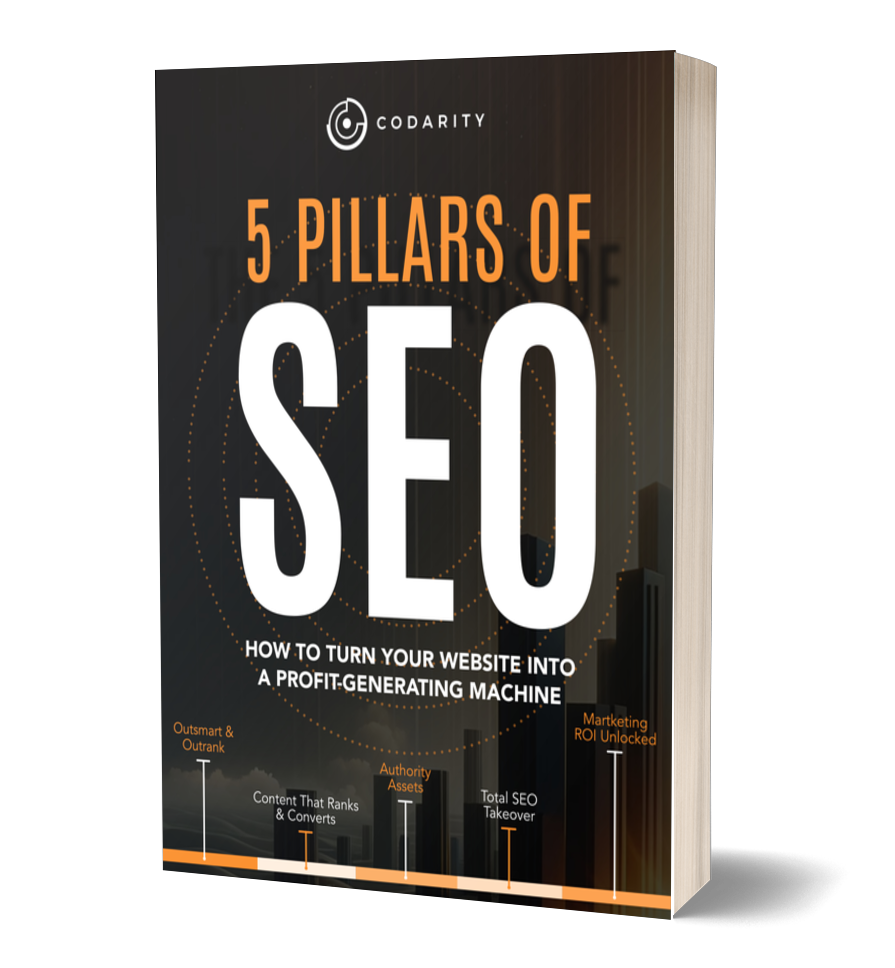
Why is Keyword Research Important?
Important. Oh-so important.
You may be a small business, a content creator or a large company. Whatever the size of nature of your business, its importance cannot be overstated. Let me tell you why.
Keyword Research for SEO is invaluable for many reasons and not just the obvious one: it will help you find the best keywords for your content. Yes. But why? I hear you ask. If you are trying to rank high in the search engine results pages: on that magic first page (who doesn’t want to rank there?).
If you want to have the relevant content. If you want to understand your target audience. Keyword research is vital to all of these and many other aspects of your business.
Keyword research asks what and how do people search, and it also asks what already exists in the search engine results. Once you know this, you can create content (better yet keywords based content) to match the findings your keyword research has yielded.
This piece of content could be a blog post or blog posts, that matches what you have found. Simply put: find keywords or find keyword phrases and create the corresponding content.
The best keyword for you may be extremely competitive. If you are a small business just starting up can you compete with a large, established enterprise? Maybe or maybe not, but it is a question you wouldn’t have asked if it wasn’t for your keyword research.
Keyword research will allow you to find the best keywords for you and your content based on the needs of your target audience and the competing content already out there. Keyword research for SEO is a must if you want to rank high in organic search results. If it is done right, keyword research it will increase your search traffic.
9 Keyword Research Tips for SEO & PPC in 2021
Now you know what keyword research is and how and why it is so important. All that you need to know now is the knowhow to make keyword research work for you.
Your keyword research may be fairly limited, or it may even be non-existent, either way, below are some tips to enhance, or start up, your keyword research process.
Good research consults a few sources, but great resource consults a wide variety. Our tips reflect this. Our list includes an eclectic mix of keyword research tools and techniques that are proven to improve your SEO in the long term. We have our favourite keyword research techniques, and we would love to share them with you. Let’s get started.
1) Make the Most of a Simple Google Search
A great starting point for your research is Google. Today, we use Google everyday for many purposes. In fact, we use the search engine so often that the process has almost become automatic: it is done without much thought at all.
This can often cause us to overlook or unintentionally disregard the insights it has to offer simply through familiarity. But, sometimes, the answer and the insight is hidden in plain sight.

Take a trip over to search engine and type in some general keyword phrases related to your business and, like magic, Google will offer you a number of autocomplete suggestions.
For example, if you was to type in ‘best printer’, beneath this search, google will suggest: ‘best printers for home use’, ‘best printers for art prints’ and ‘best printers with cheap ink’. Along with many other suggestions.
These suggestions are slightly more specific than your original search and they will be less popular, driving less monthly search volume, but this isn’t always a negative (we will touch on the benefits of lower search volume terms later).
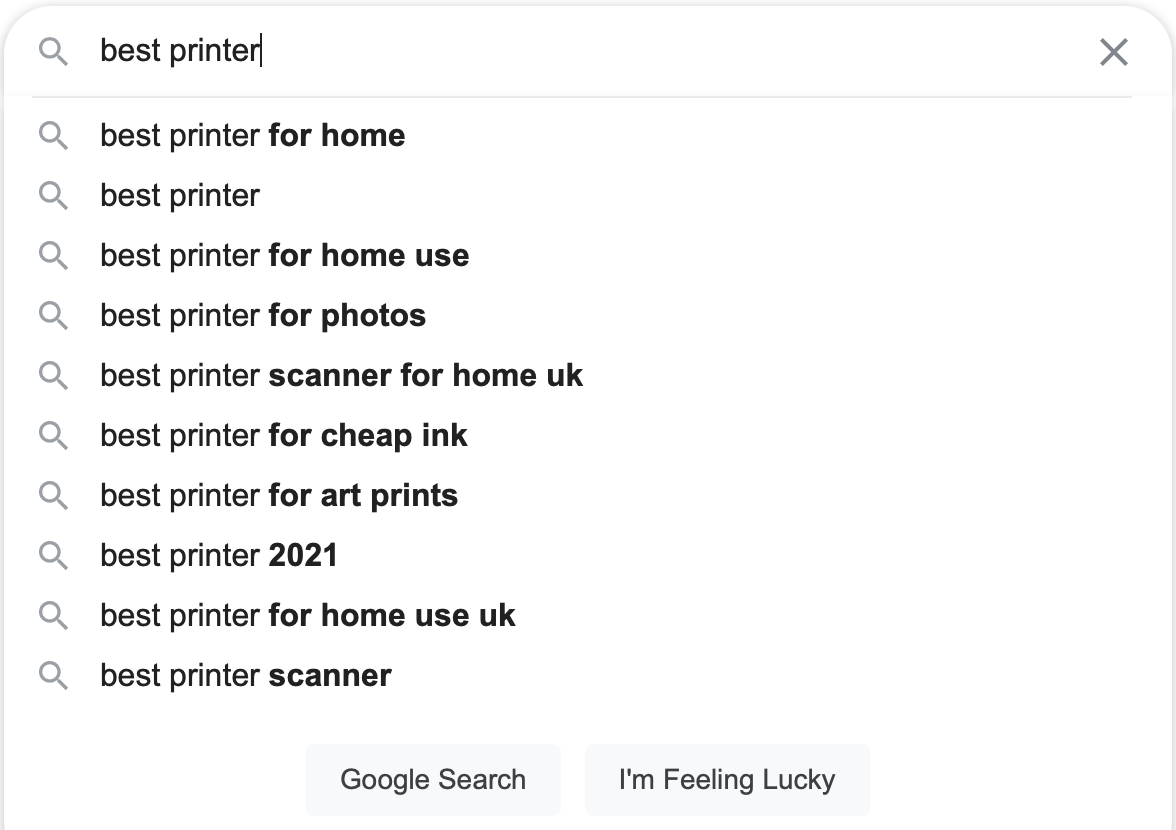
Google is a gift that keeps on giving, so if you enter this original search and scroll to the bottom of the search results, you will find the area headed ‘Related searches’.
Similar to the autocomplete suggestions, this section offers you more specific search queries that are searches related to your original, broader topic. Sticking with our printer example, the searches related section presented the long tail keyword ‘best all-in-one printer for home use’ for us to consider.
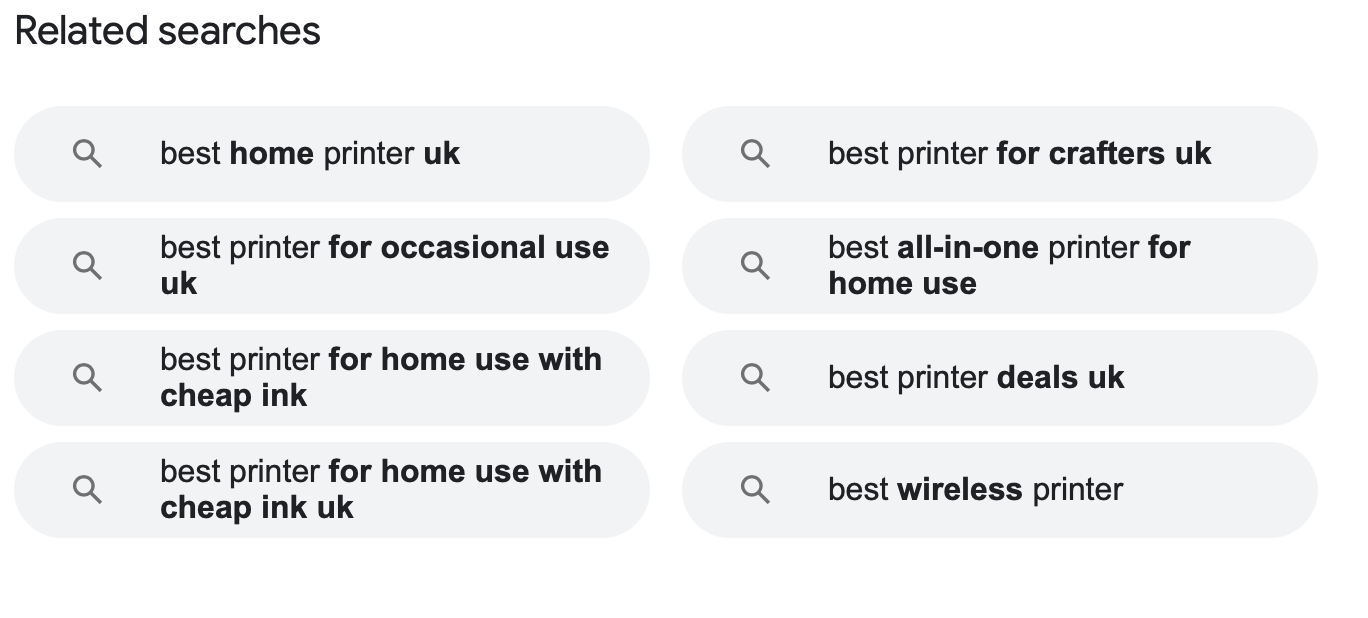
Scrolling down you may have missed a further offering from Google: the ‘People also ask’ section. This section offers you a number of common questions related to your topic. For example: ‘What is the best printer for home use?’.

It is always beneficial to start simple. The insight available from Google is abundant and, best of all, it is free, so you make sure you use it in your keyword research.
2) Use Answer the Public
Answer the Public is one of the best keyword research tools out there. Essentially, the process of ATP is not too different from the autocomplete suggestions we outlined above. The main difference is that the research tool is automated and thus, does a lot of the hard work for you.
Answer the Public is a really useful tool and, better yet, it is free and simple to use. Head over to the website, type in a keyword related to your business. The tool will then present to you a range of common questions that people are asking search engines around your keyword.

Let’s say you a small business who specialises in audio products. You type into ATP ‘headphones’ and the tool analyses the questions people ask search engines regarding this keyword.
It breaks down these common questions into the different prepositions (where who and which etc.) with which people start their queries. Under the which section, the tool presents the question ‘which headphones are best for running?’ along with many other questions.

Answer the Public displays this information through stylish visuals. These visualisations are a great way for you too see just how wide-ranging your keyword ideas and opportunities may be.
As an additional plus, these visuals are downloadable, free of charge, meaning that they are a handy way for you to document your research.
However, if you find these visualisations overbearing to begin with, which is fair enough, and you prefer good old fashioned data.
Well, you are in luck, because with a single click you can transform these visuals into a more simple data display.
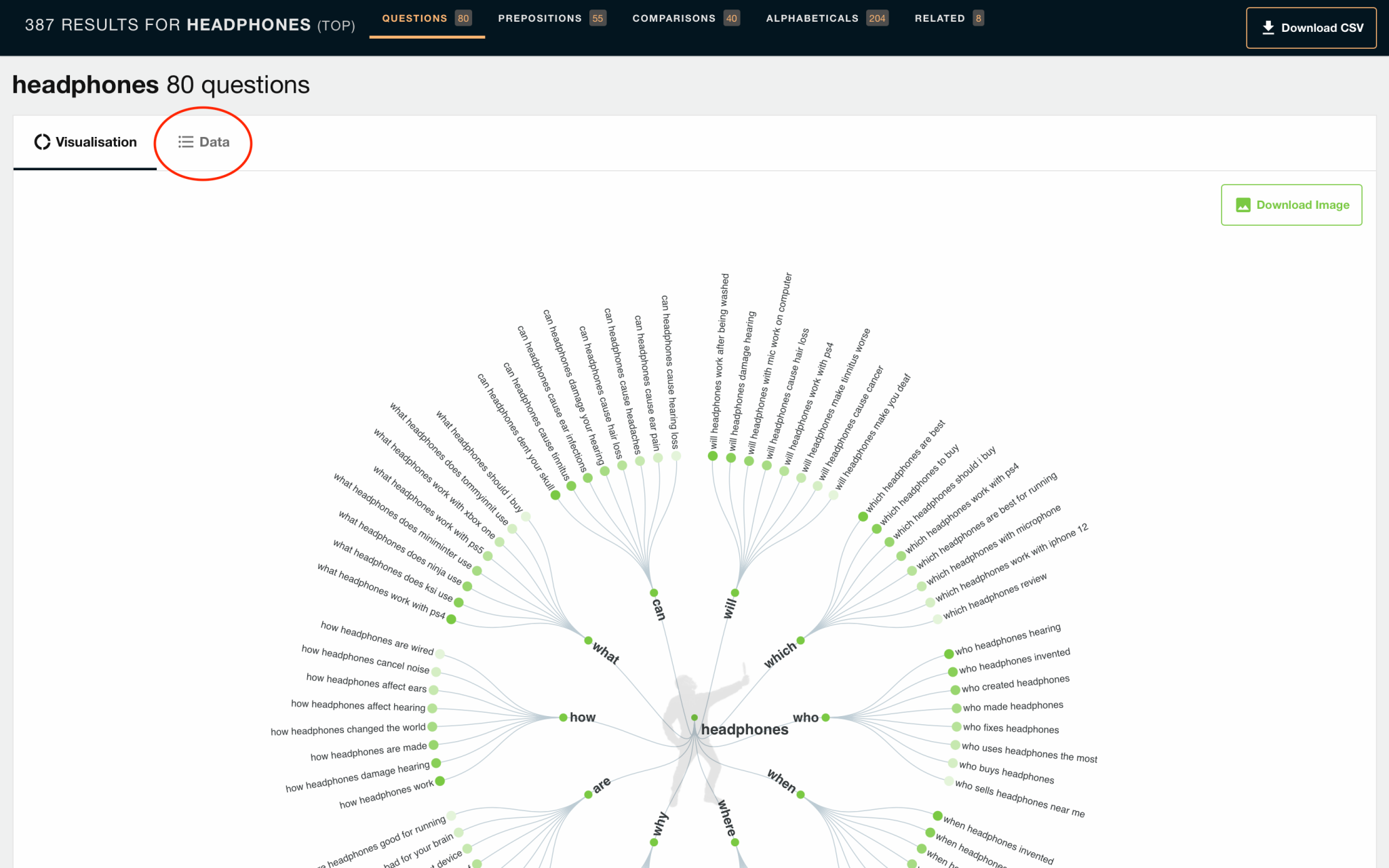
It is all a matter of preference. You may be a fan of both of these visualisations and would just appreciate the option of the two displays.
Either way, the two visualisations present the same insightful data, but in two differing ways: one more creative (that visualises opportunity and provokes further thought) and the other more straightforward (that invites objective analysis).
From time to time, a factor as simple as presentation can really compliment how you think about your research and its findings.
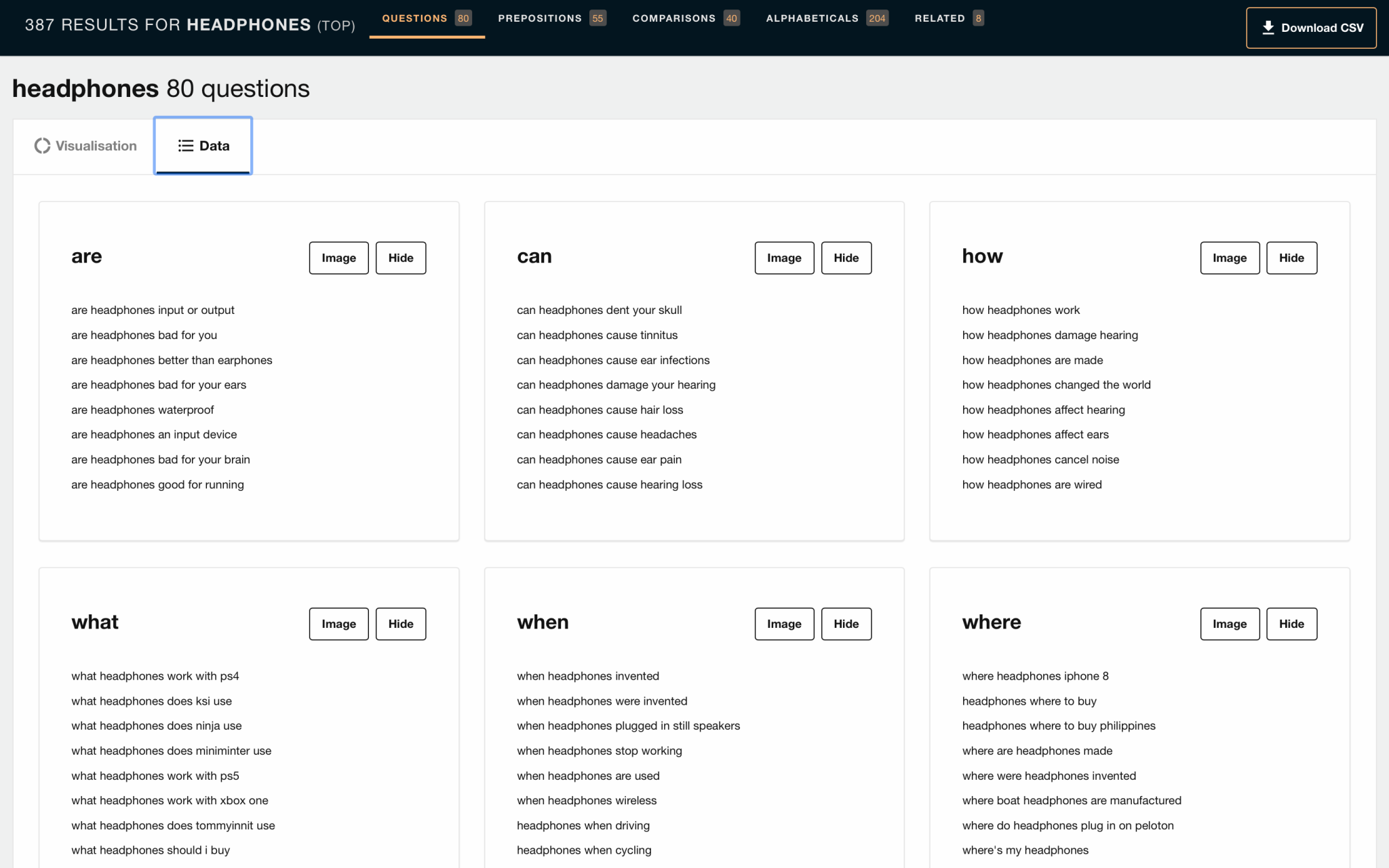
Answer the Public is a fruitful tool for your keyword research that is particularly useful in the early stage of your research process. Make sure you use the tool to your advantage as it can really kickstart your keyword ideas.
3) Use Google Keyword Planner
Okay, so now, thanks to your previous research, you have gathered a list of potential keywords. What comes next? You rightfully ask. Here’s where Google Keyword Planner comes in.
The keyword research tips up until this point can be seen as ways in which to identify keyword ideas, but eventually you are going to want to advance your research into analysis.
This process will turn your list of keywords into a considered enquiry. Google Keyword Planner, the search engine’s free keyword research tool, is perfect for this step.
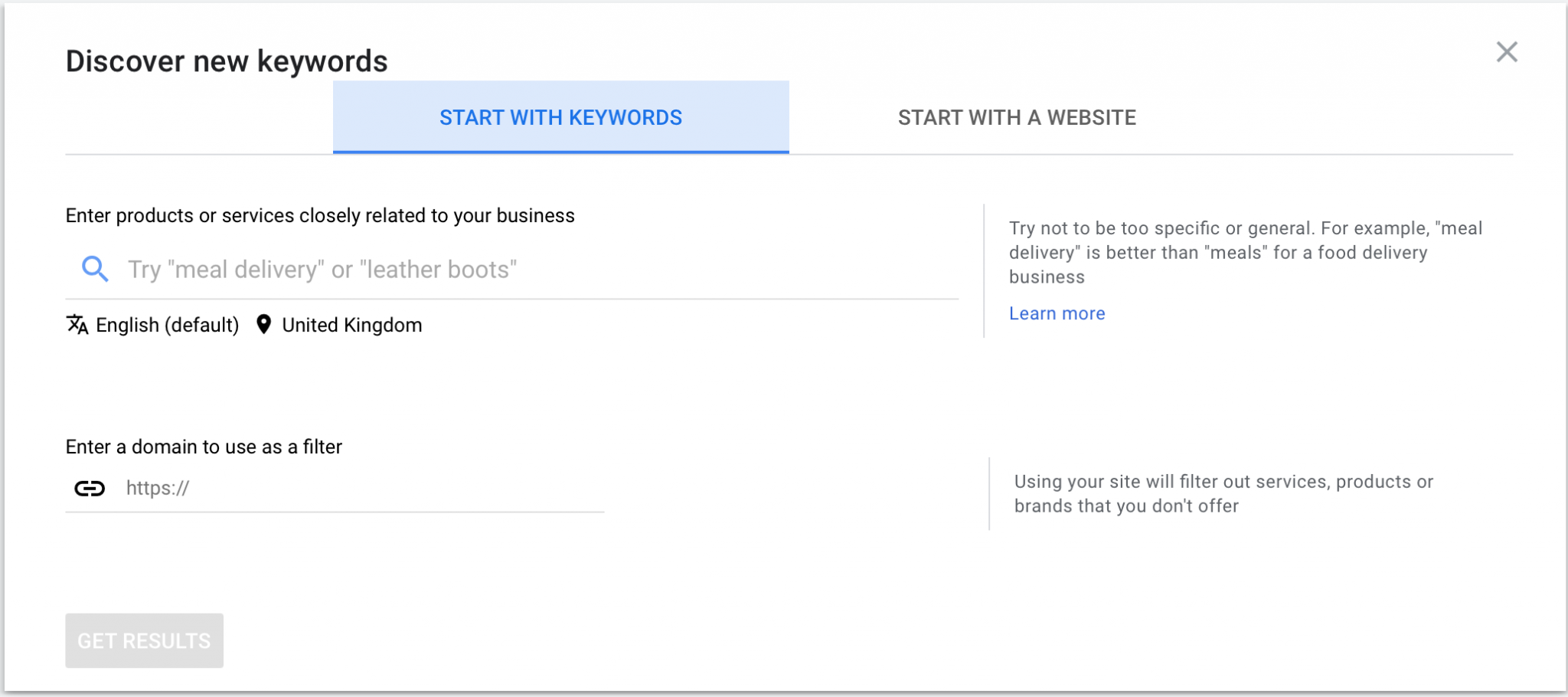
Google Keyword Planner is a brilliant tool for analysing your keyword ideas. Google’s tool will give you an idea of keyword difficulty and the monthly search volume of the keywords you are looking at.
Before we move on, let’s quickly breakdown what these two metrics are. Keyword difficulty is a measurement of how hard it will be for you to rank for a keyword based on competition.
Whilst, monthly search volume is, simply, how many times a key word is searched for in a search engine per month.
So imagine you are an interior design firm. ‘Interior design’ is a keyword with 10k-100k average monthly searches and the competition (keyword difficulty) is medium. Whereas, the keyword ‘luxury interior design’ has 1k-10k monthly searches and the competition is high.
On the other hand, ‘award-winning interior design’ has 10-100 average monthly searches and the competition is low. What this example demonstrates is that there is significant variation in search volumes and competition depending on the keyword you go for.



This information can, and should, be used to inform your decision of which keywords you will go on to target. Such a decision may go something like this: you can see that ‘award-winning interior design is less competitive than the others, and this low competition means that, with the right content, you can rank high in the organic search results.
Google Keyword Planner also shows you a cost per click estimate of what advertisers have historically paid for the keyword or keywords that you have searched.
These estimates relate to a different strategy; namely, non-organic SEO in which websites owners and businesses have to successfully bid to appear in the advert section of the Google search results. This information is given in the columns headed ‘Top of page bid (low range)’ and ‘Top of page bid (high range)’.
Organic SEO v. Non-Organic SEO is a whole different topic in itself. We recommend doing all you can organically before you consider the non-organic alternative, but there is no harm being aware of these alternative strategies when you are undertaking your keyword research.
4) Don’t be Scared of Long Tail Keywords
What, exactly, are long tail keywords? A distinction may help here. In SEO, keywords are often broken down into two types: long tail keywords and head keywords.
This distinction is all to do with search volume. Long tail keywords are longer, more specific search terms that have a relatively low search volume. Whilst, head keywords are, often, shorter, more general keywords that drive high search volume.
An example of a head keyword: “gym equipment”
An example of a long tail keyword: “affordable home workout equipment for weight training”
Even though this distinction may immediately draw you to head keywords, it is important to recognise that mostbusiness target these keywords.
This means that competition for them is extremely high. Longtail keywords, on the other hand, are less competitive because a large majority of people target head keywords instead.
This low competition means that, with the right content, you will be able to rank high in the search engine results.
A further benefit of long tail keywords is that visitors who use them are often approaching the point of purchase. These users have a very specific search intent: they know what they want and they are willing to pay for it.
Instead of the meaningless visits that head keywords can often result in, search traffic arriving through long-tail keywords are much more likely to be converted into meaningful purchases.
Diversity in strategy is of the utmost importance when it comes to SEO, so make sure you are aware of only targeting head keywords. Do not succumb to this temptation.
Balance out your approach and target some lesser targeted long-tail keywords and you will drive committed search traffic to your site. Now you know just how beneficial they can be, do not be scared of a long tail keyword or two.
5) Make the Most of Google Analytics
Google Analytics is a comprehensive service. Its uses are manifold, but it can be quite daunting to beginners, and even to some well-versed users there are features that go under the radar.
Chances are, if you’re already using Google Analytics you are looking at conversions or search volumes. Well, here’s the good news, Google Analytics can also be used in your keyword research.
If you are not already using the service, you will need to sign up to use these tools, but they are free and definitely worth the hassle.
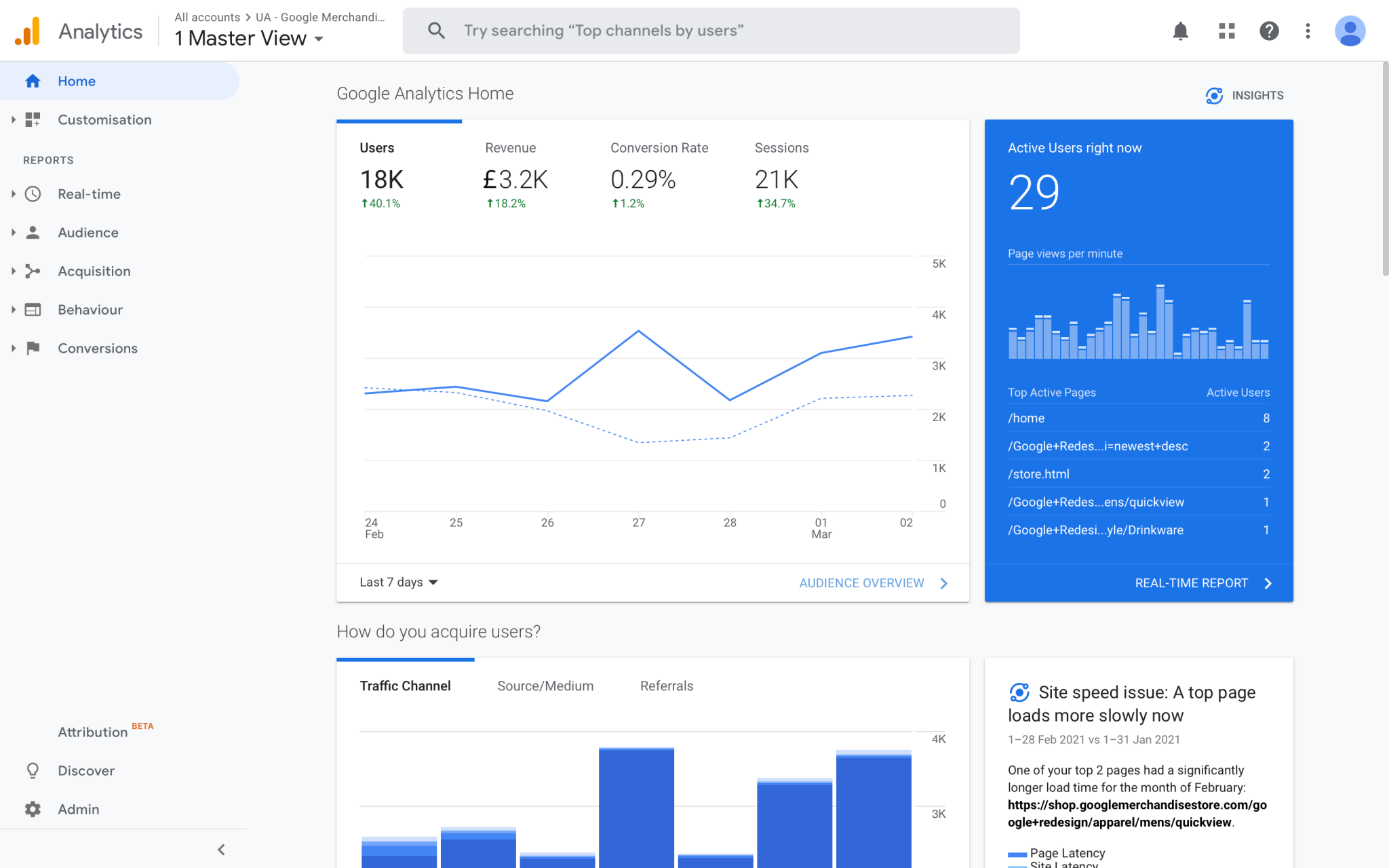
Google Search Console is a great place to start. You will find this tool under ‘Acquisition’. Once you have found this, click on ‘Search console’ and then the subsection ‘Queries’.
This section will tell you the keywords people are already using to find your site. This information is valuable, as it consolidates your understanding of how your existing traffic finds it way to you, and this, in itself, can lead to further keyword ideas.
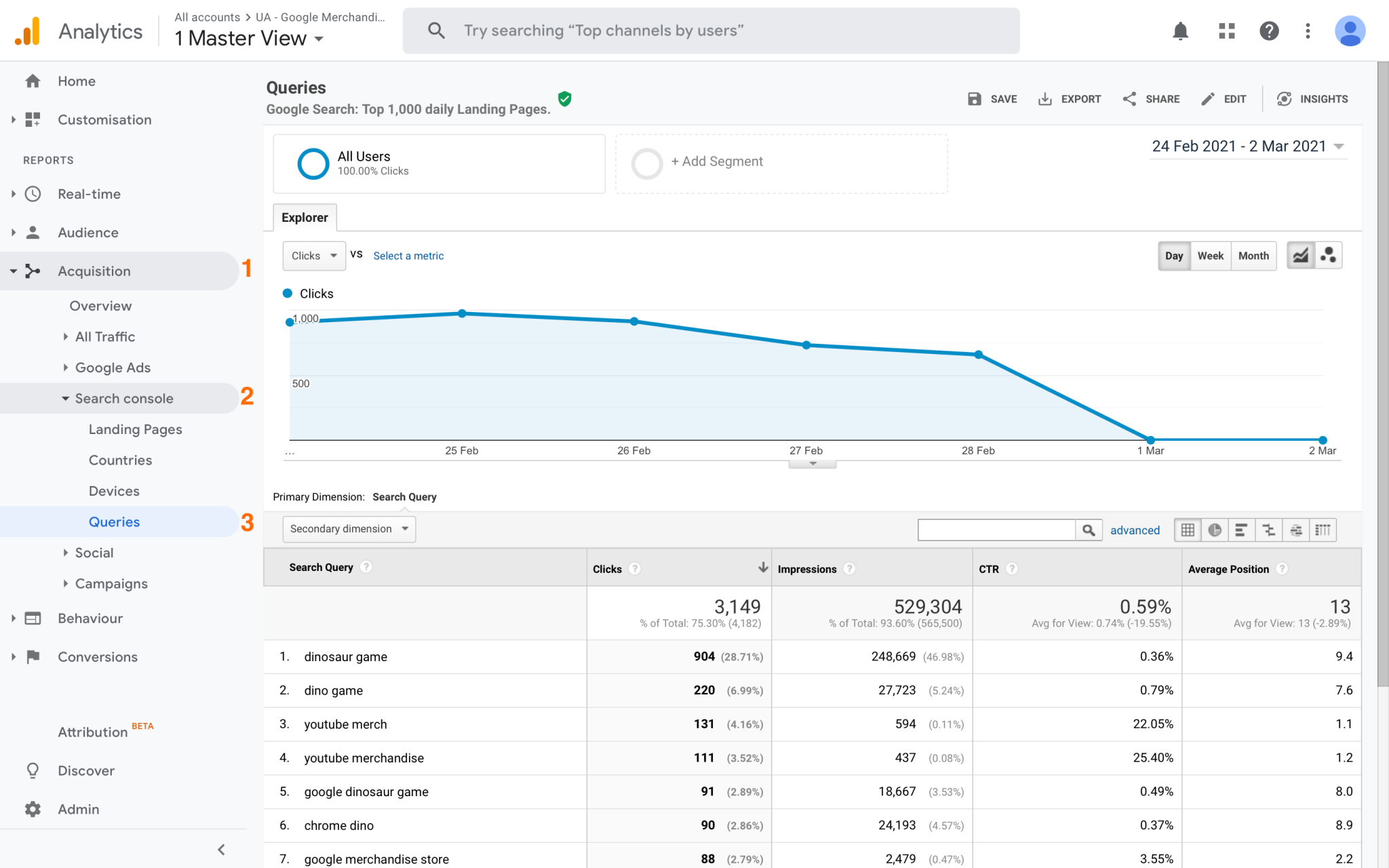
Additionally, most websites these days have a search bar to allow an internal site search function for visitors. You can use this tool to investigate the site searches people conduct when they are on your website.
Start by enabling this function, and then head to Google Analytics and find the section headed ‘Behaviour’. Click on this, and below it, you should find the ‘Site Search’ drop-down and from there the subsection ‘Search Terms’.
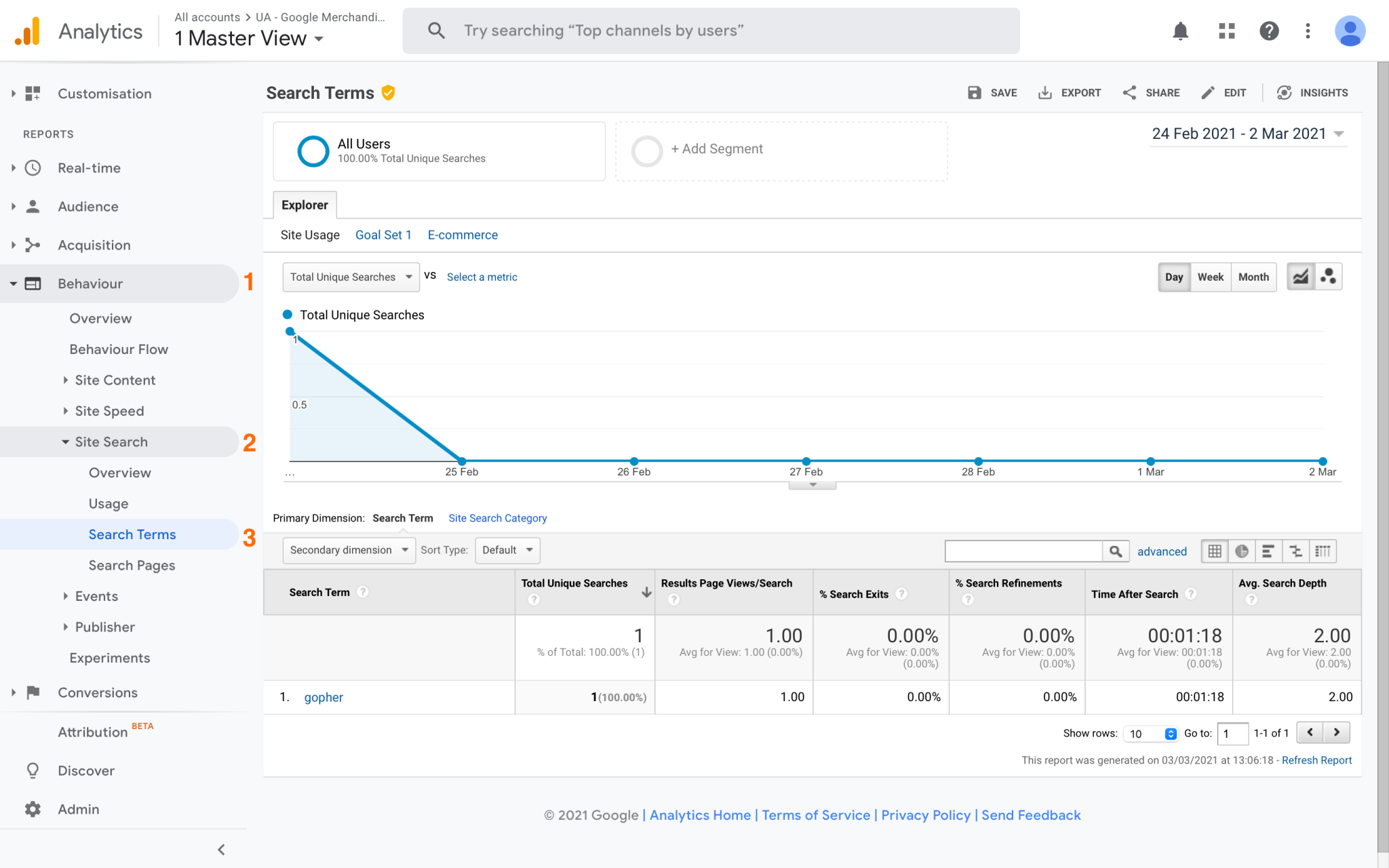
Here you will find a list of the most common keywords people are searching for on your site. Handily, the research tool will even let you know the number of times each of the keywords have been searched for.
Why does this matter? This matters because this information from Google Analytics tells you exactly what your visitors are after. This, either, lets you know that they may be struggling to find your existing content, or, if you do not have the content, it lets you know the kind that you need to be creating.
For example: let’s imagine you are running an online bookstore. Google analytics tells you that the search term ‘gift ideas’ is often searched for on your website. If you do already have the corresponding content, this tells you it needs to be brought to the fore and made more accessible.
On the other hand, if you do not already have the content these searches will prompt the creation of a blog post headed ‘5 best gift ideas for friends and family.
6) Analyse the Keywords Your Competitors are Using
Making the most of competitive analysis is one of the keyword research tips we stress the most. People are sometimes reluctant to undergo such research. This is a mistake, however, as competitive analysis is a goldmine for keyword insight.
We like to demonstrate its importance of competitive analysis by way of a sporting analogy. In sport, understanding your opponents: their tactics, techniques and methods is a vital aspect if you wish to achieve a win. Knowing such information informs your own team’s approach.
You know what your opponent does well and you know what they do less so. Well, this same logic can be applied to your approach to keywords. The way in which your competitors operate can, and should, inform your own approach.
The assumption here is that you are well aware of who your competitors are. If you do not, it is well worth you taking the time to properly work this out. I don’t just mean a rough idea of who else operates in your market; instead, you should have a concrete idea of who you are competing against.
In having a solid idea of who your competitors are, you can begin to turn this competition into valuable information. You can identify their strengths, so you can try to emulate this yourself, but, and more significantly, you can identify their weaknesses.
These weaknesses are so useful to you: they can serve as a warning for what not to do, but they can also inform your approach to bettering your competition.
One of the best ways to grasp the keywords of your competition is through the use of our trusty, and returning, friend Google Keyword Planner.
Once you have identified your closest competitors, you can enter their web address into the tool and it will present to you a list of the keywords that they are trying to target.
This will help you find a number of keywords. Some of these you may already be targeting. Some you may never have considered.
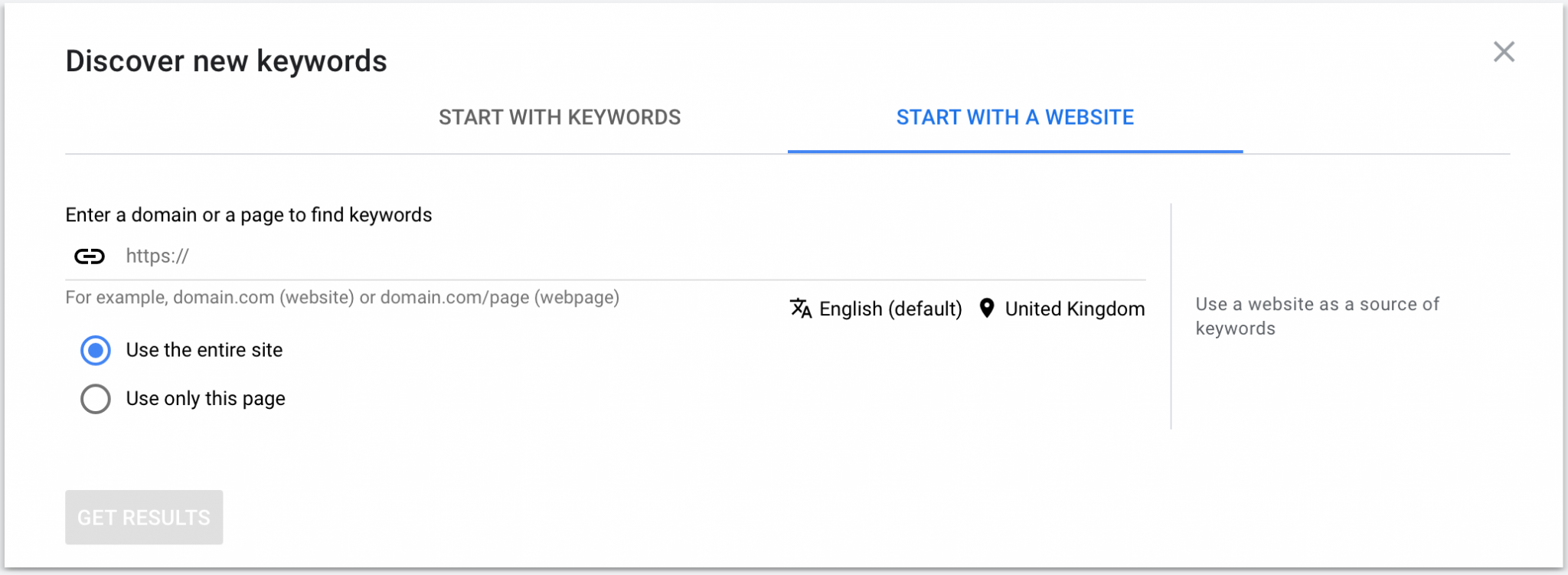
Alternatively, you could do this step toward the end of your research when you have a more solid idea of the keywords that you are going to target. In doing so, you can compare what you are targeting with the keywords that your competitors are.
This comparison, to your pleasant surprise and smugness, may consolidate your findings, or it may just raise some new considerations for you to put the final touches to your list of keywords.
At any point in your keyword research, competitive analysis is certain to result in some previously undiscovered insights, so do not shy away from it.
7) Consider Phrase Match Keyword Match Types
As we established earlier, there is organic and non-organic SEO. Pay-Per-Click (PPC) is a technique of the later. Each business has a unique budget, so let’s imagine that you have plenty of money available but almost no time.
This may just lead to you leaning toward search engine advertising.
If you decide to go for the PPC model, a factor of this will be the keyword match type you go for. When you chose a keyword match type, you are essentially telling Google how you want your ads to match up to the searches that people are making.
Therefore, understanding the different match types available to you is a fundamental aspect of a successful PPC campaign.
There are three keyword match types. These are broad match, exact match and phrase match. This research tip will focus on final match type of this list.
Phrase match will include your ads on searches that include the meaning of your keyword: this can be in searches where this meaning is implied, or it could be searches that are more direct and specific to your keyword.
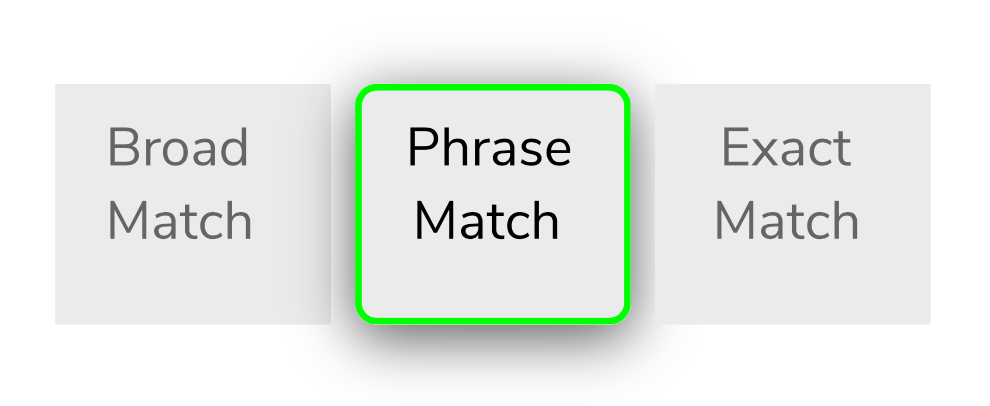
For example: let’s imagine you are an online bike retailer, your phrase match keyword may be ‘cycling helmet’ and this means that your ads may show on searches such as ‘ mens cycling helmet’, ‘buy cycling helmet’ and ‘orange cycling helmet’.
However, this match type means your ads will not show for more general, broader searches such as: “bike riding equipment” and ‘what should I look for in a cycling helmet’.
Deciding to go for phrase matching may drive lesser traffic than some of the other match types available to you, but the traffic that it does drive, typically, tends to be of a high quality. This means that there will be a higher chance of converting these visits in to purchases.
With the knowledge and know-how from your previous keyword research, phrase match keywords can drive more relevant traffic to you and your website: mitigating the risks of an unsuccessful campaign and, ultimately, increasing the return of investment.
8) Consider Negative Keywords
If you have a clear idea of what keywords that you’re targeting, then, accordingly, you should also have a clear idea of what you do not want to target.
Knowing and managing this is an important aspect of a properly targeted campaign. Negative keywords are a great way for you to go about this.
Negative keywords allow you to exclude your ads from searches that use particular words or phrases. Making use of these keywords will reduce the amount of irrelevant traffic that may be visiting your website.

Having a thorough understanding of the keywords that you are targeting will let you know some of the negative keywords that you may need to select. In this respect, all of the other keyword research tips in this list can offer insight into this decision.
This solid understanding of your targeted keywords will mean that you are aware of search terms that may be similar to your keywords, but are actually related to something completely different.
For example: let’s imagine that you run an online camera shop. Through your research, you have discovered that a portion of your traffic is looking for glasses and not camera equipment.
In light of this, you may want to select ‘lenses for glasses’ as a negative keyword to prevent this.
By putting the correct measures in place, you can prevent your PPC ads from appearing to the wrong users. This prevention will mean that you can focus, instead, on the keywords that do matter.
Managing and fine-tuning your targeting, through the use of negative keywords, will result in your ads being presented to the appropriate users: those who are far more likely to be converted into purchases and increase that all-important ROI.
9) Make the Most of Existing Content
When you are researching for keywords, it is an exciting time: you have one eye on all the new content you are going to create. This excitement and focus on the future can often lead to you ignoring the content that you already have.
This is a mistake. You should derive maximum value from your existing content.
There is insight available to you in your existing content. When looking over it, you can use keyword research to decipher the keywords that you may blindly or inadvertently be ranking for already.
Once you have identified these, you can further target them or use them as inspiration for other related keywords.
On the other hand, this preexisting content can be optimised to ensure that it continues to rank high and drive traffic. The content may be calling for a simple refresh.
When reviewing this content, ask questions such as could this content be updated? is the on-page SEO strong enough? or could I add some features?
Questions such as these will help you keep your old content fresh. Simultaneously, this process will also help you identify any missed keyword opportunities that may exist in your current content; opportunities that can be made the most of in your new keyword campaign.
In other words, make the most of what you have to make your keyword strategy and content come that much better.
Recap
Good research leads to great content. Invest adequate time and attention into your keyword research and it will play dividends.
The best keyword research is diverse in strategy, from many sources and personalised to you and your business, so consult our list of research tips and do not be afraid to discover and take on a few of your own techniques.
Let’s run through our keyword research tips a final time:
- Make the most of a simple Google search
- Use Answer the Public
- Use Google Keyword Planner
- Don’t be scared of long tail keywords
- Make the most of Google Analytics
- Analyse the keywords your competitors are using
- Consider phrase match keyword match types
- Consider negative keywords
- Derive insight and value from existing content
Write these down, recite them, but, most importantly of all, incorporate these into your research and you are sure to see beneficial results.
Now you’ve researched the keyword research tips, it is time to get your own keyword research process started.
In the words of Kurt Lewin: no action without research; no research without action.
- Roadmap for longterm, sustainable growth.
- Behind the scenes of your competitor's strategies.
- How to generate more leads and sales like clockwork.
- Detailed ROI report and traffic projection.
- No pressure selling, no-obligation.

What Is Topical Authority: An In-Depth Guide
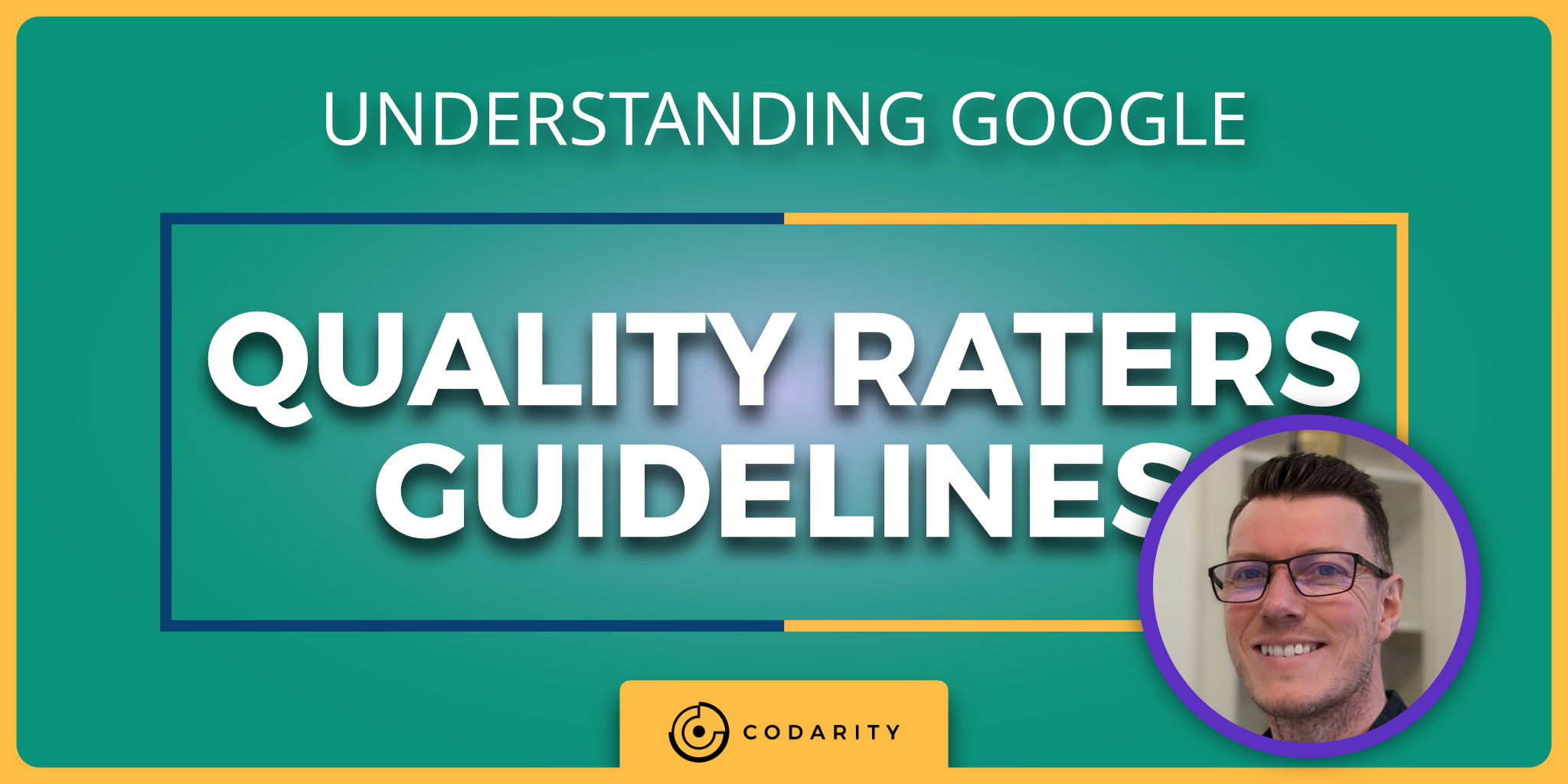
Understanding Google Quality Rater Guidelines for Business Owners
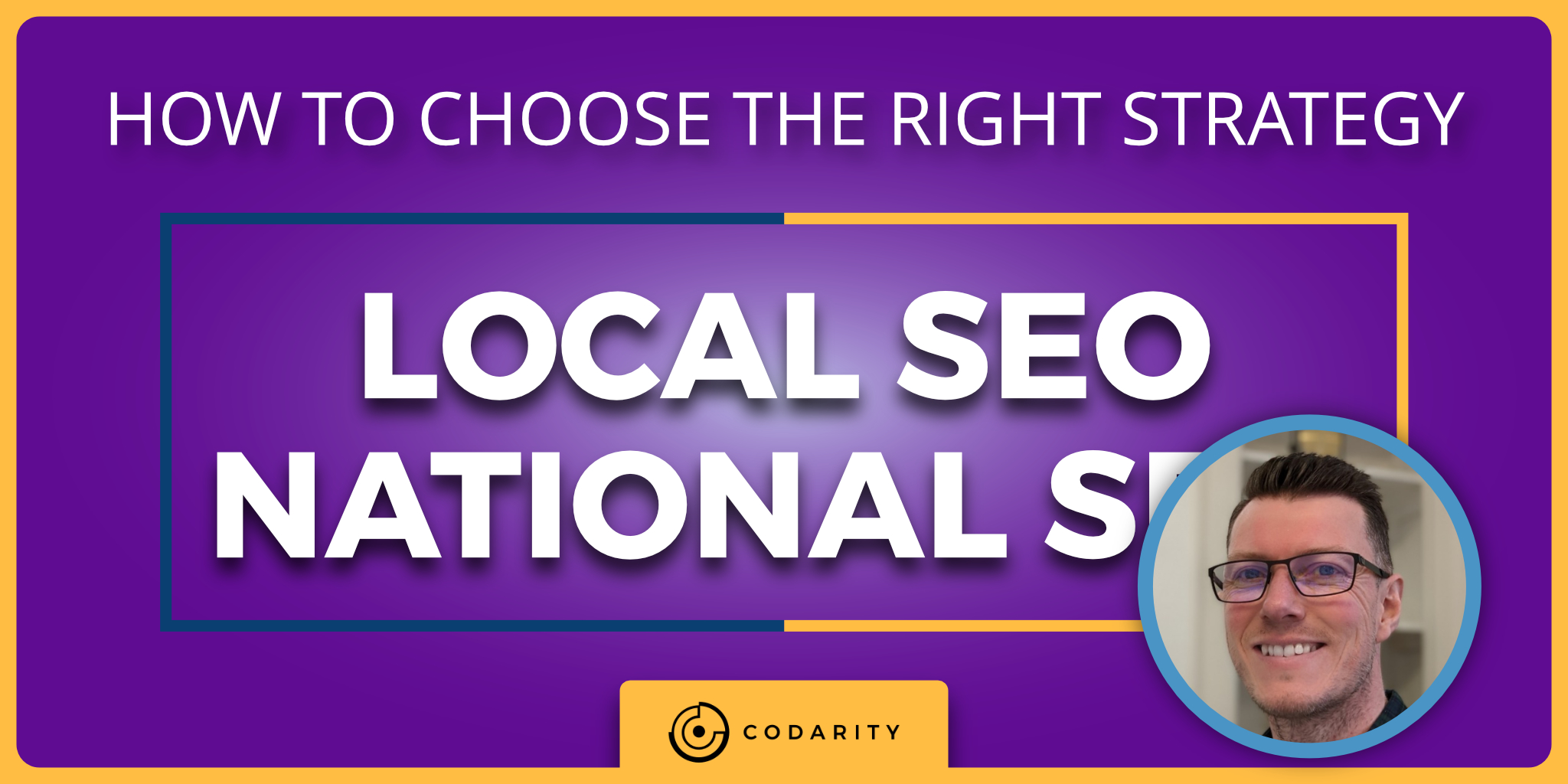
Local SEO vs National SEO: How To Choose The Right Strategy




Good angle on the negative keywords and AnswerThePublic is really super helpful in generating new ideas for content.
Author
Thanks, Lawrence – A lot of people forget about that, even though it can make a huge difference to how far your budget goes.
Great tips, Dan.
Many underestimate the power of Google. Autosuggest, related searches, and even Google Trends are all good ways to find keyword and topic ideas.
Thanks for sharing!
Author
Totally agree Erik. It’s easy to get caught up in a million different tools, when Google often gives us the best data directly in the SERP